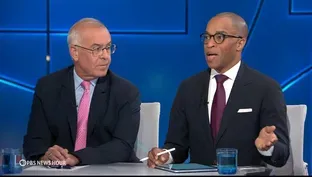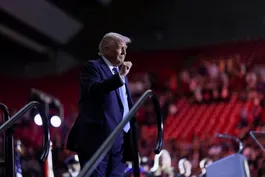
Jobs market defies expectations amid tariff fears
Clip: 5/2/2025 | 4m 51sVideo has Closed Captions
Jobs market defies expectations amid fears tariffs could soon spur economic downturn
The U.S. labor market beat expectations last month, adding 177,000 jobs as the unemployment rate held steady at 4.2 percent. But the April jobs number was lower than the March tally and some economists are concerned that cracks in the economy are beginning to show as the effects of President Trump’s tariffs become clearer. Amna Nawaz discussed more with Julia Coronado of MacroPolicy Perspectives.
Problems with Closed Captions? Closed Captioning Feedback
Problems with Closed Captions? Closed Captioning Feedback
Major corporate funding for the PBS News Hour is provided by BDO, BNSF, Consumer Cellular, American Cruise Lines, and Raymond James. Funding for the PBS NewsHour Weekend is provided by...

Jobs market defies expectations amid tariff fears
Clip: 5/2/2025 | 4m 51sVideo has Closed Captions
The U.S. labor market beat expectations last month, adding 177,000 jobs as the unemployment rate held steady at 4.2 percent. But the April jobs number was lower than the March tally and some economists are concerned that cracks in the economy are beginning to show as the effects of President Trump’s tariffs become clearer. Amna Nawaz discussed more with Julia Coronado of MacroPolicy Perspectives.
Problems with Closed Captions? Closed Captioning Feedback
How to Watch PBS News Hour
PBS News Hour is available to stream on pbs.org and the free PBS App, available on iPhone, Apple TV, Android TV, Android smartphones, Amazon Fire TV, Amazon Fire Tablet, Roku, Samsung Smart TV, and Vizio.
Providing Support for PBS.org
Learn Moreabout PBS online sponsorshipAMNA NAWAZ: Welcome to the "News Hour."
The U.S. labor market beat expectations last month, adding 177,000 jobs.
The unemployment rate held steady at 4.2 percent.
But the April jobs number was lower than the March tally.
And some economists are concerned that cracks in the economy are beginning to show, as the effects of President Trump's tariffs become clearer.
The parse the latest report, were joined by Julia Coronado, president and founder of MacroPolicy Perspectives.
That's an independent economic research and consulting firm.
She's also a professor at the McCombs School of Business at the University of Texas at Austin.
Julia, welcome back to the "News Hour."
So, a stronger-than-expected jobs report here.
What does that say to you about how employers are viewing these tariffs and trade wars?
JULIA CORONADO, MacroPolicy Perspectives: So you're right.
It's a still-healthy job market.
We had a solid number of job gains for April.
We did see a few warning signs.
So we saw some downward revisions to the job gains of prior months.
And we also know that the federal job cuts that have been announced to date have not fully been reflected.
Many of these employees are still on paid leave.
And so they did not show up as job losses.
We also saw a boost from the trade, from that surge of imports we saw that was ahead of the tariffs.
We saw a lot of transportation and warehousing.
That sector may feel some pain in coming months.
So, still healthy, still a decent number of job gains, but still concern about the trend, which is sort of on a cooling trend.
AMNA NAWAZ: And we know the Trump administration says that they expect trade deals to start to close soon and announce them.
But, in this era of uncertainty, what does that mean for how employers are able to plan, how they're able to make plans for both staffing and hiring, but also layoffs if needed?
JULIA CORONADO: That's right.
I mean, you're touching that there's two challenges for firms right now.
One is the trade war itself.
They have to pay higher tariffs.
There are supply chain frictions that may come along with that.
There's some retaliatory measures in other countries.
That creates actual increased costs and difficulties doing business.
The second challenge is just not knowing where this ends.
Not knowing what the landing place is or sort of what the strategy is for the next few months leaves companies with a lot of uncertainty.
They just don't know when sort of the clouds will lift and they will know what the world looks like.
And that makes it difficult to commit to hiring and investing and spending.
So we hear a lot from companies about wait and see, about just holding off.
And that's a dangerous dynamic for the macroeconomy.
The more companies do that, the fewer job gains we might see, and then the whole feedback loop between hiring and spending and growth grinds to a halt.
AMNA NAWAZ: Julia, as you know, there's been a lot of headlines about concerning data points in the economy, consumer confidence slipping and market losses and so on.
But we should point out, for the past couple of months, the job market has beat expectations.
You have now seen the market losses that we saw in the last several weeks now wiped away.
Does this all say something to you about the resilience of the economy or is it too soon to tell?
JULIA CORONADO: Probably a little of both.
The U.S. economy often surprises us with its resilience.
It is a gigantic ocean liner.
We have the largest, most diversified economy in the world.
So tipping it over is not easy.
It doesn't happen very frequently.
And it really takes a lot of bad news and shocks to actually tip the economy into a recession.
So I would say, yes, it's a relief that we see the job market still healthy overall.
But it is too soon to draw strong conclusions.
We have just experienced this shock.
There's a lot of -- if you think about businesses, there's a lot of activity that's still in the pipeline that's moving forward.
It's really kind of that next wave of plans that we need to keep an eye on.
So business sentiment has taken a hit.
Consumer sentiment has taken a hit.
We need to watch for whether that sort of gloomy sentiment actually translates into decision-making really in the next three to six months.
AMNA NAWAZ: All right, Julia Coronado, president and founder of MacroPolicy Perspectives, thank you so much for joining us.
Really appreciate your time.
JULIA CORONADO: My pleasure.
Brooks and Capehart on reaction to Trump's first 100 days
Video has Closed Captions
Clip: 5/2/2025 | 10m 46s | Brooks and Capehart on what voters think about Trump's first 100 days (10m 46s)
Conservative perspective on Trump's authority over history
Video has Closed Captions
Clip: 5/2/2025 | 6m 26s | Conservative offers perspective on Trump's effort to exert authority over history and art (6m 26s)
A look at Trump's order targeting public media funding
Video has Closed Captions
Clip: 5/2/2025 | 5m 56s | A look at Trump's executive order targeting public media funding (5m 56s)
News Wrap: Army plans anniversary parade on Trump's birthday
Video has Closed Captions
Clip: 5/2/2025 | 6m 53s | News Wrap: Army plans 250th anniversary parade on Trump's birthday (6m 53s)
Unpacking Trump's budget proposal and what he wants to cut
Video has Closed Captions
Clip: 5/2/2025 | 6m 55s | Unpacking Trump's budget proposal and where he wants to cut billions in spending (6m 55s)
Yemeni diplomat asks U.S. for more support fighting Houthis
Video has Closed Captions
Clip: 5/2/2025 | 9m 33s | Top Yemeni official visits Washington seeking more U.S. support in fighting Houthis (9m 33s)
Providing Support for PBS.org
Learn Moreabout PBS online sponsorshipSupport for PBS provided by:
Major corporate funding for the PBS News Hour is provided by BDO, BNSF, Consumer Cellular, American Cruise Lines, and Raymond James. Funding for the PBS NewsHour Weekend is provided by...

















